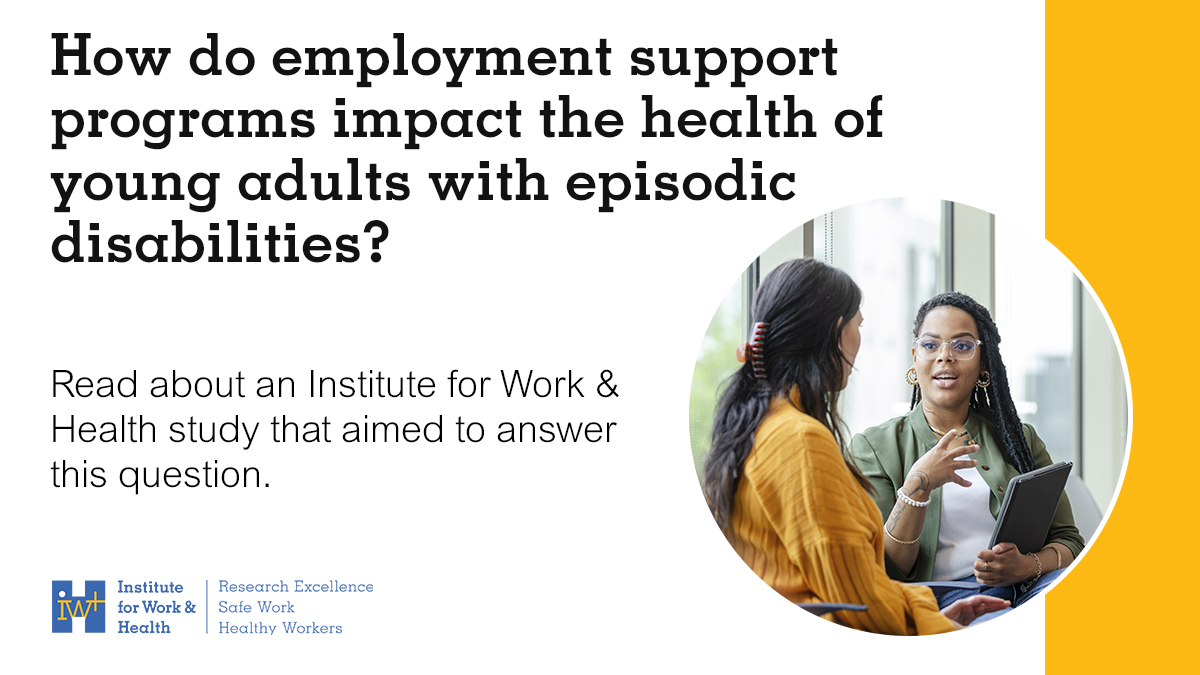Why was this study done?
Episodic disabilities are those where symptoms occur variably, and periods of good health are interspersed with periods of worsened or poor symptoms. As many as one in six working-aged adults report fluctuating limitations at work due to an episodic disability. The unpredictable and often invisible nature of episodic disabilities can make it challenging for workers to find and sustain employment while managing their fluctuating symptoms and work demands. For young adults navigating early career phases, these challenges may also have life-long impacts on their career progression and health. This study set out to investigate whether programs aimed at helping young adults with episodic disabilities gain or sustain employment can also have an impact on their health and well-being.
How was this study done?
The research team conducted a systematic review of peer-reviewed studies published between 2001 and 2021. To find studies to include in the review, the researchers searched for those studying income or employment support programs for young adults (aged 18-35 years on average) living with any episodic disability, and that measured the programs’ effects on any health outcome. The search criteria included only studies that were conducted in high-income economies, that used quantitative methods, and that were published in English, French or Spanish.
This search yielded 15,269 published articles. The team then screened these articles for their relevance to the study and their quality. Five articles met the team’s criteria to be included as part of this review. These were the only five that focused on young adults with an episodic disability and assessed health impacts of employment interventions. They were all deemed medium quality. Because so few studies met the criteria for this review, and each had variable methods, the team opted to describe the findings as a narrative rather than to calculate numerical estimates of the effects interventions may have had on health.
What did the researchers find?
In all five studies, each employment intervention showed improvements in health outcomes for young adults with episodic disabilities. One study examined a personalized coaching initiative in the United States. The initiative provided mentorship to young adults with mental health conditions to help them meet their career and educational goals, and to build career confidence. Participants reported improved career confidence and mental health, but no difference in quality of life when compared to a control group.
Three studies examined supported employment programs in community and clinical settings for young adults with mental health conditions. These programs provided employment placement services, career counselling and help with health management. Participants in these programs showed improved engagement with their job and participation in employment (including more hours worked), and improvements in quality of life and well-being. They also showed declines in depressive symptom severity, fewer health complaints and fewer limitations due to their condition. In one of these programs, where supported employment was part of a specialty health-care program for individuals with psychosis, the more sessions of the program attended by a participant, the more likely they were to participate in employment.
The fifth study examined a German patient education program in a clinical setting for young adults with diverse chronic health conditions, the majority of which were episodic. This program included a specific career development module. Participants in this program were more likely to report greater work-preparedness and health-related quality of life compared to a control group.

What are the implications of the study?
The findings of this study suggest that involvement in supported employment programs could provide health benefits for young adults with episodic disabilities, though more research is needed to elaborate on these findings.
All of the programs studied also included disability-specific supports alongside employment supports, which may have accounted for some of the health benefits seen. Training on balancing health and work demands may prove useful for young adults with disabilities.
The programs captured in this study did not explicitly address the challenges associated with fluctuating nature of episodic disabilities, representing a need for future research into this distinct aspect. There was also a limited focus on job conditions, job quality, the availability of work accommodations and health and safety resources—factors that may shape health outcomes.
What are some strengths and weaknesses of the study?
A strength of this study was its rigorous systematic review methodology. Each step of the methodology is standardized and carefully defined, from identifying the search for relevant literature, to screening studies and appraising their quality, as well as extracting the data.
Though employment is widely described as a social determinant of health, there are a limited number of high-quality studies focusing on the health impacts of employment support programs. Further research can help determine what aspects of these programs may provide health benefits to young adults and how enhancing employment could impact participants’ health.
Four of the five included studies focused on young adults with mental health conditions, which may indicate a growing recognition that mental health difficulties may play a role in employment difficulties for young adults. However, studies about employment supports for more common conditions in young adults (conditions such as juvenile arthritis and inflammatory bowel disease) were lacking.
Finally, as only quantitative research was used for this review, the use of additional forms of evidence such as qualitative or grey literature may help to broaden the results found here.